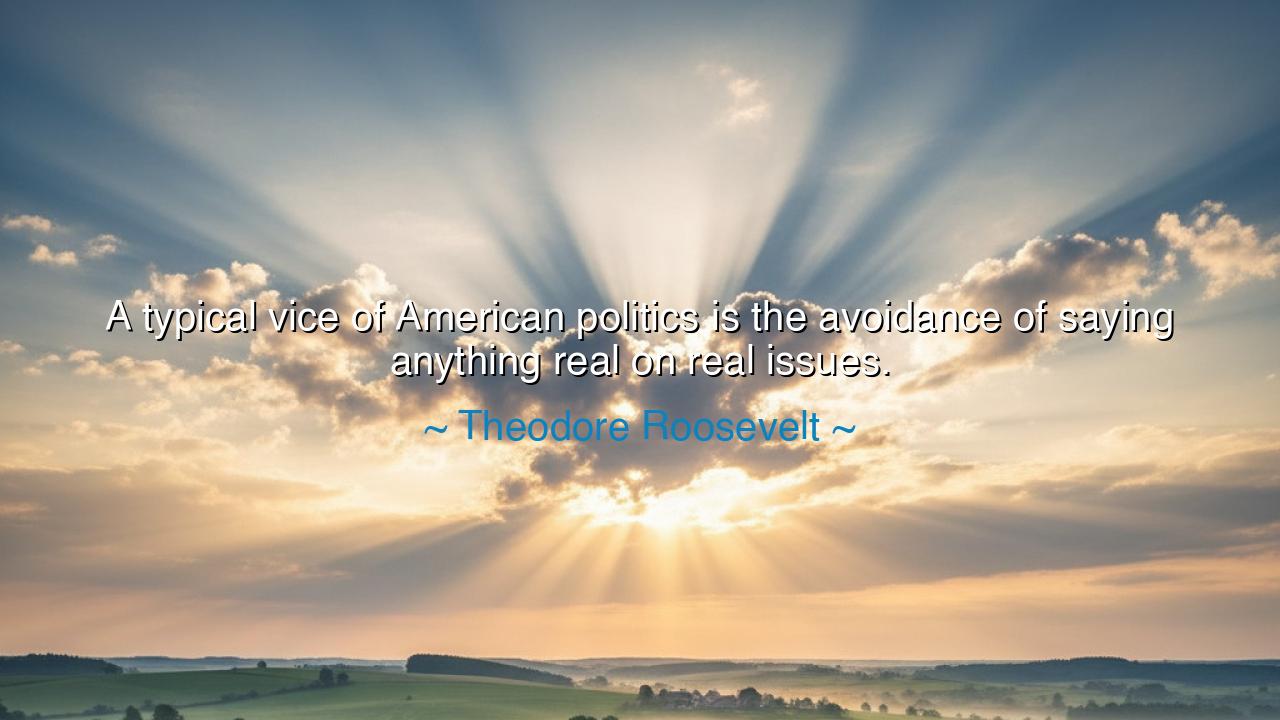
A typical vice of American politics is the avoidance of saying
A typical vice of American politics is the avoidance of saying anything real on real issues.






When Theodore Roosevelt declared, “A typical vice of American politics is the avoidance of saying anything real on real issues,” he tore the mask from the faces of statesmen who preferred comfort to courage. In these words burns the timeless truth that politics, when corrupted, becomes a theater of evasions, where leaders speak endlessly yet say nothing, dressing emptiness in fine phrases while the people’s deepest struggles remain untouched.
Roosevelt himself was a man who scorned cowardice in words as much as in deeds. He knew that nations rise and fall not only by armies and laws, but by whether their leaders dare to face real issues directly: poverty, corruption, justice, the dignity of labor. To avoid these truths is to betray the people, for the silence of leaders in the face of suffering is itself a form of violence. The avoidance of honesty leaves festering wounds where healing words and decisive action are required.
The ancients, too, saw this vice. In Rome, senators often cloaked their ambition in endless speeches, avoiding the heart of the matter while the Republic withered. Cicero himself lamented that men who should have defended liberty instead wrapped themselves in rhetoric, unwilling to confront the decay at the state’s core. So too in Roosevelt’s America: to speak boldly of monopolies, exploitation, or inequality was dangerous—but to avoid them was cowardly.
History offers proof of the peril. Before the Civil War, countless leaders danced around the great evil of slavery, refusing to name it for what it was. They spoke of “compromises” and “balances,” but their words were hollow shells that delayed justice and deepened division. Only when Abraham Lincoln broke through the fog of avoidance, naming slavery as a moral wrong, did the nation confront the truth at last—at terrible cost. Roosevelt’s words recall this: that the refusal to speak plainly breeds greater calamities than truth ever could.
Thus, let his teaching endure: a nation’s leaders must not hide behind rhetoric, nor fear the wrath that follows plain speech. Better to speak the truth and be despised than to gild lies and be praised. For American politics, like all politics, stands or falls on whether it confronts reality with honesty. And if leaders will not name the real issues, then the people themselves must demand it, lest their silence become the snare that binds the fate of the republic.






LATran Thi Lan Anh
Roosevelt’s comment about American politics dodging real issues makes me question the motivations behind political discourse. Is it easier for politicians to avoid tough topics because it helps them keep their base intact, or are they genuinely fearful of tackling hard truths? When did it become acceptable for political leaders to offer only platitudes and avoid serious discussion on the issues that truly affect the public? How can we change this pattern of avoidance?
HHeuHaiHuoc
I’ve always thought Theodore Roosevelt had a clear understanding of the problems in American politics, and this quote really sums up one of the biggest issues: the avoidance of real discussion. Instead of tackling hard topics like healthcare, climate change, or income inequality head-on, politicians seem to evade them with vague rhetoric or empty promises. How do we, as voters, demand that our leaders engage with these issues in a real, substantive way?
GDGh Dung
Roosevelt’s statement about American politics feels so true, especially in today’s environment of spin and sound bites. Politicians often dance around real issues and instead focus on superficial topics that distract from what’s really going on. Is this avoidance a symptom of the current political climate, or has it always been this way? How do we create a culture where politicians are encouraged to have genuine, honest conversations about the issues that impact our society?
AQAnh Quynh
Roosevelt’s quote is still so relevant today. It’s almost like politicians today are more focused on avoiding tough conversations or making controversial statements than addressing real issues. Is it fear of alienating voters or a strategic decision to avoid conflict? Whatever the reason, it feels like we rarely get clear, direct answers on the issues that actually matter. How can we push for more honesty and transparency from our political leaders, especially on critical issues?